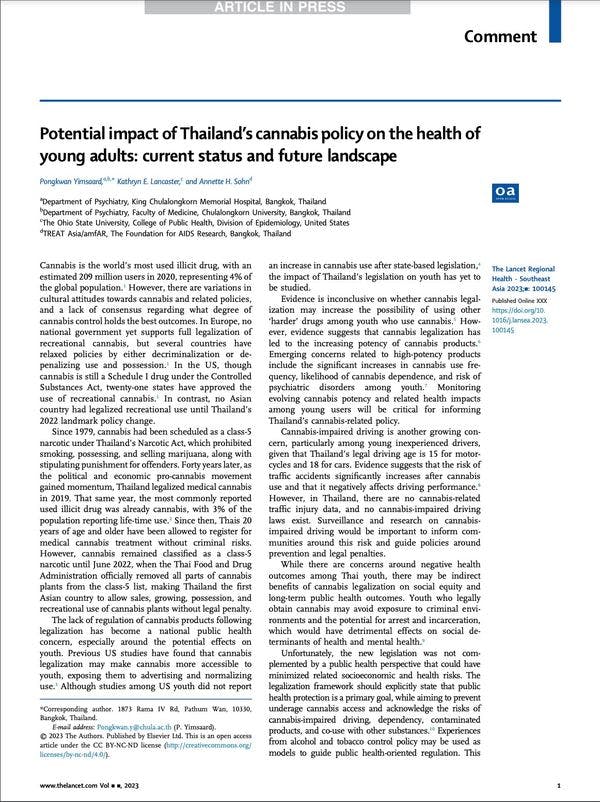L'impact potentiel de la politique thaïlandaise en matière de cannabis sur la santé des jeunes adultes : état des lieux et perspectives d'avenir
Yimsaard et al. notent que l'impact de la légalisation du cannabis sur la santé publique en Thaïlande doit faire l'objet d'un suivi attentif et soulignent la nécessité de lignes directrices fondées sur des données scientifiques pour informer les stratégies de prévention et mettre en œuvre des interventions auprès des populations à risque, y compris les jeunes adultes. Pour en savoir plus, en anglais, veuillez lire les informations ci-dessous.
Cannabis is the world's most used illicit drug, with an estimated 209 million users in 2020, representing 4% of the global population.1 However, there are variations in cultural attitudes towards cannabis and related policies, and a lack of consensus regarding what degree of cannabis control holds the best outcomes. In Europe, no national government yet supports full legalisation of recreational cannabis, but several countries have relaxed policies by either decriminalisation or de-penalising use and possession. In the US, though cannabis is still a Schedule I drug under the Controlled Substances Act, twenty-one states have approved the use of recreational cannabis.1 In contrast, no Asian country had legalized recreational use until Thailand's 2022 landmark policy change.
Since 1979, cannabis had been scheduled as a class-5 narcotic under Thailand's Narcotic Act, which prohibited smoking, possessing, and selling marijuana, along with stipulating punishment for offenders. Forty years later, as the political and economic pro-cannabis movement gained momentum, Thailand legalised medical cannabis in 2019. That same year, the most commonly reported used illicit drug was already cannabis, with 3% of the population reporting life-time use. Since then, Thais 20 years of age and older have been allowed to register for medical cannabis treatment without criminal risks. However, cannabis remained classified as a class-5 narcotic until June 2022, when the Thai Food and Drug Administration officially removed all parts of cannabis plants from the class-5 list, making Thailand the first Asian country to allow sales, growing, possession, and recreational use of cannabis plants without legal penalty.
The lack of regulation of cannabis products following legalisation has become a national public health concern, especially around the potential effects on youth. Previous US studies have found that cannabis legalisation may make cannabis more accessible to youth, exposing them to advertising and normalising use. Although studies among US youth did not report an increase in cannabis use after state-based legislation, the impact of Thailand's legislation on youth has yet to be studied.
Téléchargements
Régions
Profils associés
- The Lancet Regional Health Southeast Asia
